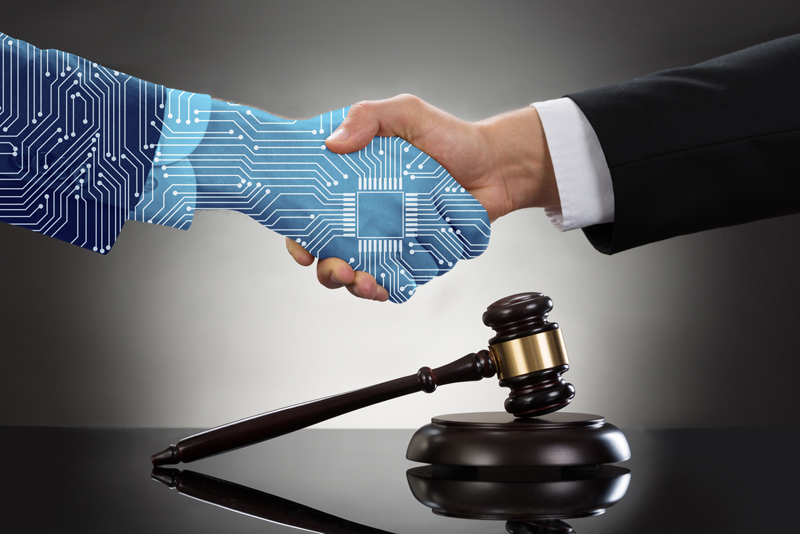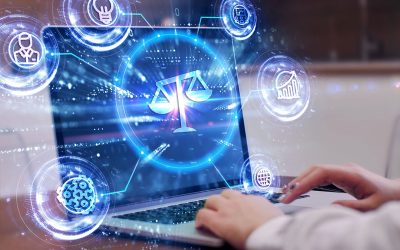To conduct litigation, law firms need to manage volumes of documents. In the past, lawyers relied heavily on document scanning services to get paper documents scanned into their databases. Today, legal transcription companies help lawyers convert their audio recordings into well-formatted electronic documents. However, even with digitization, lawyers have to deal with an abundance of data and use advanced techniques for e-discovery, legal research and document review. Now, artificial intelligence (AI) and machine learning are revolutionizing the legal scenario by changing the way lawyers manage and utilize big data.
AI or cognitive computing refers to computers learning how to complete tasks typically done by humans. Machine learning is a branch of AI based on the idea that systems can learn from data, identify patterns and make decisions with minimal human intervention (www.sas.com). AI has transformed the way lawyers think, work, conduct business, and deal with clients.
- Courtroom Transcription: Even a minor error in courtroom transcription can have devastating consequences by punishing the wrong people, and more. This underlines the importance of expert legal transcription services for documenting court proceedings. According to a recent TechZone360 report, enterprising legal transcriptions can now take advantage of AI through speech and voice recognition to provide error-free courtroom transcripts. Advanced software can ensure both speed and accuracy. Launched in October 2019, Courtside is a new automated courtroom service that uses AI and natural language processing to analyze and transcribe court records captured through digital recording (futureofworknews,com).
- Identify Patterns in Data: Cognitive computing enables next generation language processing and identifies patterns in data. Next-gen language software NextLP performs tests to assess the data and find results, thereby creating new ways for lawyers to look at data. By identifying patterns and stories in data, NextLP allows legal professionals to focus on utilizing the nuanced analysis and application of the results to their case (www.abajournal.com).
- Document Review and Legal Research: After flagging potential issues, AI can identify and collect the necessary documents for possible litigation. It can also prioritize the documents that must be looked at first through sampling. Machines are much faster than human beings and AI’s document review capability significantly reduces the time that lawyers would need to spend on e-discovery and document review. Rather than simple keywords, the software looks for concepts to provide better results. The AI system from ROSS Intelligence leverages natural language processing to perform legal research in a timely and comprehensive manner (www.forbes.com).
- Predict Legal Outcomes: By analyzing data, AI can help make predictions about the outcomes of legal proceedings. People often ask their lawyers about their probability of winning their case, so that they can decide whether to go to trial or settle. AI has the predictive power to help lawyers forecast litigation outcomes or give better answers to such questions.
- Due Diligence: Lawyers perform due diligence to provide clients with assessing risks and structuring agreements for mergers and acquisitions (M&A). Due diligence is an arduous, time-consuming task that involves various stages – from preparation and goal-setting to the analysis and classification of financial statements, contracts and other important information. In addition to the time required to complete the task, errors can occur, frustrating the legal team and affecting the integrity of the deal. AI can speed up the process and eliminate human errors (www.imanage.com). AI interprets and analyzes the data and prepares it for further review. The process allows lawyers to provide accurate analysis and counsel to their clients.
- Contract Review: Companies need to keep track of a large number of contracts, many of which lack uniformity and are difficult to organize, manage, and update. Inefficient contracting can cause firms to lose a lot of value on a deal. Most businesses seek the help of legal firms to review their contracts and identify risks and issues in the contract language that could have negative impacts for them. Legal teams identify and extract vital data points, edit contracts, and help firms decide if they should go ahead and sign the contract or not or negotiate better terms on the deal. AI contracting software has improved the way firms conduct contracting. Advanced software can review contracts in bulk quicker and with fewer errors than humans.
It is obvious that AI and machine learning are transforming the legal industry. Speech to text software or speech recognition in AI, instead of replacing legal transcription services, actually provides legal transcriptionists with the opportunity to improve efficiency. However, manual transcription is better than machine-generated text in specific areas. For example, unlike human transcriptionists, speech recognition software cannot spot homophones – words that have different meanings and are written differently, but sound the same. Examples include: allude/elude, their/there, ensure/insure. The software may also take time to understand nuances in legal audio recordings.




